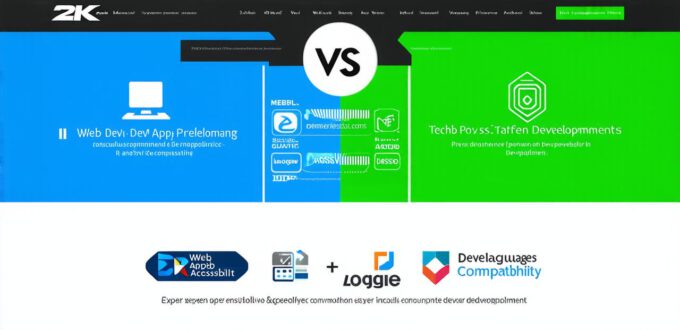Web development and app development are two different but closely related fields of work. Both involve building software applications that run on devices like computers, smartphones, and tablets. However, there are some key differences between web development and app development that developers should be aware of when deciding which field to pursue. In this article, we’ll explore the main differences between these two types of development and provide some insights into why one might be better suited for a particular individual or project.
Introduction:
Web development involves building websites and web applications that run in a web browser on a computer or mobile device. The primary goal of web development is to create a user-friendly interface that allows people to access information, perform tasks, and interact with other users through the internet. Examples of web applications include email clients, social media platforms, and online shopping websites.
Web developers use a variety of programming languages and tools, including HTML, CSS, JavaScript, and various server-side languages like PHP, Ruby, and Python. They typically work in an Agile development environment and follow a standard software development lifecycle that involves planning, designing, coding, testing, and deploying the application.
What is Web Development?
App development involves building mobile applications for smartphones and tablets. The primary goal of app development is to create a user-friendly interface that allows people to access information, perform tasks, and interact with other users through a mobile device. Examples of mobile applications include social media platforms, gaming apps, and e-commerce websites.
App developers use various programming languages and tools, depending on the platform they are developing for. For example, iOS developers typically use Swift or Objective-C, while Android developers use Java or Kotlin. Both iOS and Android app development follow a standard software development lifecycle that involves planning, designing, coding, testing, and deploying the application.
Differences Between Web Development and App Development:
1. Platform: The primary difference between web development and app development is the platform on which they are built. Web development focuses on building applications for the web, while app development focuses on building applications for mobile devices.
2. User Experience: Mobile apps tend to have a more immersive user experience than websites because they can take full advantage of the device’s hardware and software capabilities, such as GPS, camera, and accelerometer. Websites are limited by their reliance on a web browser, which may not support all features or have access to certain data.
3. Performance: Mobile apps tend to perform better than websites because they can be optimized specifically for the device’s hardware and software. Websites must rely on server-side resources to run, which can result in slower performance and increased latency.
4. Distribution: Mobile apps are distributed through app stores, while websites can be accessed directly from a browser or search engine. This means that mobile apps have the advantage of being discoverable by millions of users through the app store, whereas websites require manual promotion to attract visitors.
5. Monetization: Apps tend to be more profitable than websites because they offer a range of monetization options, such as in-app purchases, ads, and subscriptions. Websites are limited by their reliance on advertising or subscription models.
Advantages of Web Development:
1. Wide Reach: Websites can be accessed from any device with an internet connection, making them a great option for businesses that want to reach a wide audience.
2. Cost-Effective: Building a website is generally more cost-effective than building a mobile app, as it requires fewer resources and less specialized expertise.
3. Flexibility: Websites can be updated and modified easily, making them ideal for businesses that need to change their content or functionality quickly
4. SEO Optimization: Websites are easier to optimize for search engines than apps, which makes them more visible to potential customers
Advantages of App Development:
5. High Engagement: Mobile apps tend to have higher engagement rates than websites because they offer a more immersive user experience and can be accessed easily from the device’s home screen.
6. Personalization: Mobile apps can be personalized to the individual user, allowing businesses to deliver highly targeted content and offers
7. Offline Capabilities: Many mobile apps can be used offline, making them ideal for businesses that operate in areas with limited or no internet connectivity
8. Push Notifications: Mobile apps can send push notifications directly to the device, allowing businesses to keep their customers informed about new products, promotions, and updates
Case Study: Uber vs. Lyft
Uber and Lyft are two of the most popular ride-hailing services in the world. Both companies offer similar services, but they have taken different approaches to development.
Uber built its platform on a web-based architecture, with the majority of its functionality running on servers. This allowed them to quickly scale their service as demand grew and enabled them to integrate with existing payment systems and infrastructure. However, this also meant that their app was not optimized for mobile devices, which made it slower and less user-friendly than competitors like Lyft.
Lyft took a different approach by building its platform on a native mobile architecture, with the majority of its functionality running directly on the device. This allowed them to deliver a faster and more immersive user experience, which helped them gain a foothold in the market before Uber caught up. However, this also meant that they faced challenges with scaling their service as demand grew, as they had to rely on a more limited set of servers to support their app.
GroupLayout
